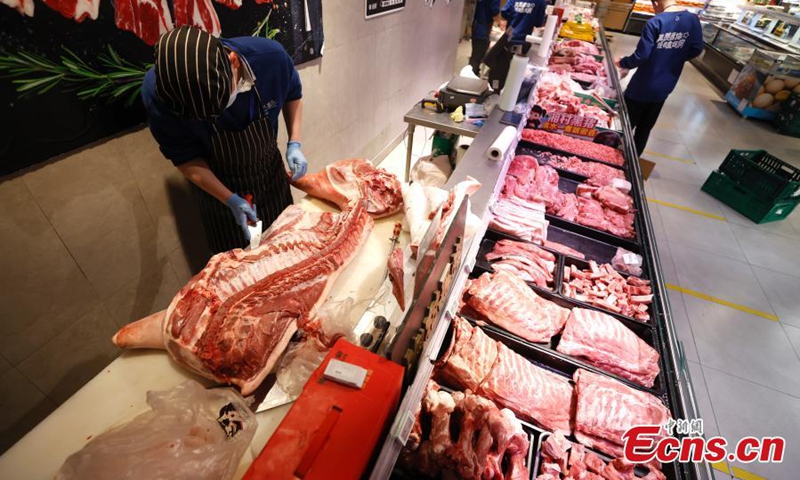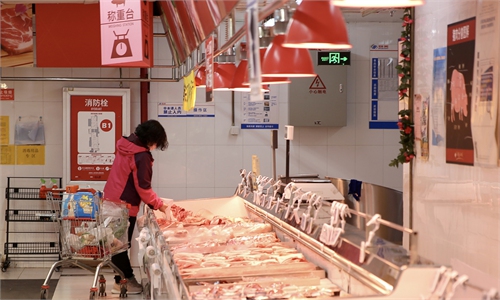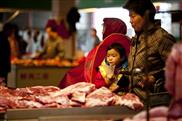China’s hog production remains stable, resilient despite reported African swine fever disruption: industry insiders

Pork products are seen at a Hema Fresh store in Chaoyang District, Beijing, April 26, 2022. Photo: China News Service
China's hog production capacity and prices remain stable and resilient with no particular impact from African swine fever, thanks to ramped up efforts already in place to secure safe manufacturing and supply, major pork producers and an industry group told the Global Times on Friday.
The remarks were made as African swine fever came under the spotlight after some foreign media reports said it would have a big impact on production and prices.
A surge in African swine fever infections in China is set to reduce hog output later this year, Reuters reported, citing farm managers and analysts, indicating that hog prices will be pushed up as demand recovers.
The Reuters report, citing a report released by Huachuang Securities, said that the current swine fever infection area in the northern production area of China may be nearing 50 percent.
Chinese pig farm owners and an industry representative group denied the claims in the report when reached by the Global Times on Friday, assuring the public that domestic hog production and prices currently remain stable and resilient.
An employee with leading pork producer Muyuan Food Co said that there has been no particular impact from swine fever, after the company formed a prevention and control management system in response to major animal infectious diseases.
For example, pig farms are equipped with air ventilation systems and personnel frequently disinfect the plants so as to ensure the hygiene of the pig farms.
Another employee with Luoyang CP Food Co, a large pork producer in Central China's Luoyang, Henan Province, told the Global Times on Friday that the corresponding preventative measures have already been taken, as the disease started several years ago.
Both producers denied that there had been any impact from swine fever on their hog production.
The Huachuang Securities report also said that based on the African swine fever speculation, the long-term average price of pigs may rise to more than 20 yuan per kilogram, a claim that was also backed up by some foreign media.
The nation's average hog price on Thursday stayed at around 15 yuan per kilogram, maintaining this level since reaching the yearly peak of 27 yuan last October.
"Since the hog price is at a fairly low level, some may intend to speculate on the market to push up the price," a source with the China Meat Association (CMA) told the Global Times on Friday when asked about the report.
He noted that as this is a serious issue, study report on African swine fever and its impact must be scientifically based, and "any attempt at market speculation will bring no good to business operations and industry supply chains."
Huachuang Securities refused to comment on the report or its source when reached by the Global Times on Friday.
The Chinese government and industry groups have attached great importance to the prevention and control of animal diseases, as part of efforts to ensure food safety, especially after African swine fever spread to China in 2018.
Efforts such as continuous optimizing and adjusting of the epidemic prevention and control strategy have been made in a bid to create a good environment for the healthy breeding of pigs, the Ministry of Agriculture and Rural Affairs said in a recent statement.
In addition to halting hog imports from countries with potential risks of infection, authorities are also ramping up the supervision of breeding and slaughtering.
Data from the National Bureau of Statistics shows that domestic pork production came to 55.41 million tons in 2022, accounting for 44.5 percent of the global total. The annual share was also relatively stable.
present, pork production capacity is at a reasonable level, and there are no conditions for a sharp increase, Fu Linghui, a spokesperson for the National Bureau of Statistics, said at a press conference on Wednesday.


